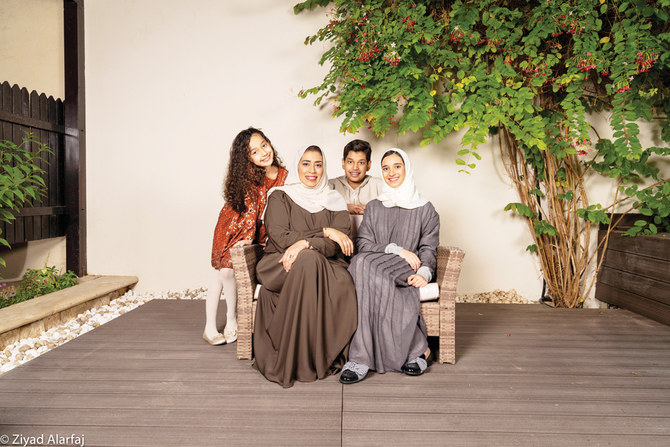I was born in Jeddah and I am the eldest of five children — I have two sisters and two brothers.
My father married my mother when she was in the 10th grade, and she stopped her education to become a wife and a mother, but she never gave up on her dream of graduating high school. And when I was in my second year of college, I actually attended my mother’s high school graduation.
I spent most of my childhood living between Saudi Arabia and the US. My father was a general in the Royal Saudi Air Force, and in 1984 he was appointed to the Embassy of Saudi Arabia in Washington, the city I called home for almost 20 years.
I completed most of my education in the US. I received my high school diploma from the Islamic Saudi Academy, my bachelor’s degree in psychology from American University and my master’s degree in community counseling from George Washington University.
Raising Muslim children when you’re surrounded by Western culture is quite a challenge, but my parents made sure that we were exposed to what American culture had to offer, while having a strong bond to our religion and culture. They made sure to speak to us in Arabic so that we did not lose our mother language. I have always thought of it as getting the best of both worlds.
My parents were always an inspiration: Creating a home and a stable family life for us while they were thousands of miles away from their own families. I learned great lessons from them. From my father, Gen. Abdulaziz Aseel, I learned hard work, dedication and having a strong character. From my mother, Thoria Etaiwi, I learned patience, kindness and selflessness.
As a child, moving back and forth was not easy. Constantly changing schools, friends, location and homes. There was a lack of stability but, reflecting on it now, I realize it has shaped me into the person I am today. It made me adaptable to the curve balls that life throws. In addition, my interaction with people of different races, religions and cultures has made me more accepting and tolerant.
Moving back home was bittersweet, because I left one home for another. But I soon found my place among family, friends and colleagues.
I began my career at the National Guard Hospital, where I worked for seven years. That was the bridge between the knowledge I gained in the US and applying it to help people in my country.
After seven years in a government hospital, I decided to target the private sector. For the past 10 years, I have worked at Psych Care Clinics as a mental health counselor. The focuses of my practice are adolescents and adult females with various mental disorders and social problems.
The evolution of mental health development in Saudi Arabia over the past 20 years has been remarkable to witness. The increase in awareness of the importance of mental health has been very fast — it has changed from being a taboo subject to a well-recognized field.
In 2007, I was one of the founding members of Zahra Breast Cancer Association. Being part of this amazing organization and working with such dedicated women gives me great pride. I also co-founded a psychoeducation support group called “Blossom,” which helps cancer survivors adjust to life after completing their treatment. The group teaches patients that there is a life after cancer full of hope and new dreams.
That is something I understand well, as my mother is a cancer survivor. Seeing her go through that journey while far away from her family has increased my empathy for cancer patients and their loved ones. I hope that I can be a helping hand for these women fighting cancer and let them know that no one needs to struggle alone.
I am a proud wife and a mother of three. I feel very lucky to be married to a man that I can call my friend, supporter and confidant. My pride and joy are Aljudy (15), Yousif (12) and Lana (8).
Being a mother has taught me unconditional love and patience. It has made me a better human and a role model they can be proud of. Motherhood has taught me to live in the moment and enjoy life for its simplicity.
In the future, I hope that my kids will get to live their dreams and grow into individuals who care about giving back to their country and helping it grow.
I hope to continue to be part of the growth of the mental health field and to see Saudi Arabia become one of the leading countries in research and new treatments. I also hope to develop my own private practice that not only focuses on treatment but also on raising awareness of mental health wellness.
And I hope a cure for cancer will be found soon, to end the struggle of thousands of people.




















